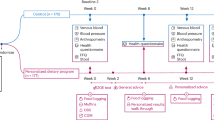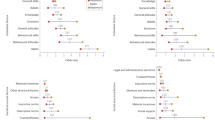Abstract
Background/Objectives:
Strategies to achieve healthier diets for children are likely to benefit from an understanding of the determinants. We examined environmental and individual predictors of children's intake of ‘core’ foods (fruit and vegetables) and ‘non-core’ foods (snacks and sweetened beverages). Predictors included parental intake, home availability, parental feeding styles (Encouragement and Monitoring) and children's food preferences. Based on research with older children, we expected intake of both food types to be associated with maternal intake, core foods to be more associated with children's preferences and non-core food intake more with the home environment.
Subjects/Methods:
Primary caregivers (n=434) of children (2–5 years) from preschools and Children's Centres in London, UK, completed a self-report survey in 2008.
Results:
Multiple regression analyses indicated children's fruit intake was associated with maternal fruit intake (B=0.29; P=0.000), children's liking for fruit (B=0.81; P=0.000) and a Monitoring style of parental feeding (B=0.13; P=0.021). Children's vegetable intake was similarly associated with maternal intake (B=0.39; P=0.000), children's liking for vegetables (B=0.77; P=0.000), Encouragement (B=0.19; P=0.021) and Monitoring (B=0.11; P=0.029). Non-core snack intake was associated with maternal intake (B=0.25; P=0.029), Monitoring (B=−0.16; P=0.010), home availability (B=0.10; P=0.022) and television viewing (TV) (B=0.28; P=0.012). Non-core drink intake was associated with maternal intake (B=0.32; P=0.000) and TV (B=0.20; P=0.019).
Conclusions:
Results indicate commonalities and differences in the predictors of core and non-core food intake, with only maternal intake being important across all types. Effective interventions to improve young children's diets may need to call on different strategies for different foods.
This is a preview of subscription content, access via your institution
Access options
Subscribe to this journal
Receive 12 print issues and online access
$259.00 per year
only $21.58 per issue
Buy this article
- Purchase on Springer Link
- Instant access to full article PDF
Prices may be subject to local taxes which are calculated during checkout
Similar content being viewed by others

References
Bates B, Lennox A, Swan G (2009). National Diet and Nutrition Survey Headline results from Year 1 of the Rolling Programme (2008/2009).
Bell AC, Kremer PJ, Magarey AM, Swinburn BA (2005). Contribution of ‘non-core’ foods and beverages to the energy intake and weight status of Australian children. Eur J Clin Nutr 59, 639–645.
Biddle SJH, Gorely T, Marshall SJ, Murdey I, Cameron N (2004). Physical activity and sedentary behaviours in youth: issues and controversies. J Roy Soc Prom Health 124, 29–33.
Birch LL, Fisher JO, Grimm-Thomas K, Markey CN, Sawyer R, Johnson SL (2001). Confirmatory factor analysis of the child feeding questionnaire: a measure of parental attitudes, beliefs and practices about child feeding and obesity proneness. Appetite 36, 201–210.
Birch LL, Fisher JO (1998). Development of eating behaviors among children and adolescents. Pediatrics 101, 539–549.
Boutelle KN, Birnbaum AS, Lytle LA, Murray DM, Story M (2003). Associations between perceived family meal environment and parent intake of fruit, vegetables, and fat. J Nutr Educ Behav 35, 24–29.
Brown R, Ogden J (2004). Childrens eating attitudes and behaviour: a study of the modelling and control theories of parental influence. Health Educ Research 19, 261–271.
Butte NF, Fox MK, Briefel RR, Siega-Riz AM, Dwyer JT, Deming DM et al. (2010). Nutrient intakes of US infants, toddlers, and preschoolers meet or exceed dietary reference intakes. J Am Diet Assoc 110, S27–S37.
Campbell KJ, Crawford DA, Ball K (2006). Family food environment and dietary behaviors likely to promote fatness in 5–6 year-old children. Int J Obes 30, 1272–1280.
Campbell KJ, Crawford DA, Salmon J, Carver A, Garnett SP, Baur LA (2007). Associations between the home food environment and obesity-promoting eating behaviors in adolescence. Obesity (Silver Spring) 15, 719–730.
Committee on Public Education (2001). Children, Adolescents, and Television. Pediatrics 107, 423–426.
Cooke L, Wardle J, Gibson EL (2003). Relationship between parental report of food neophobia and everyday food consumption in 2–6-year-old children. Appetite 41, 205–206.
Cooke LJ, Wardle J, Gibson EL, Sapochnik M, Sheiham A, Lawson M (2004). Demographic, familial and trait predictors of fruit and vegetable consumption by pre-school children. Public Health Nutr 7, 295–302.
Cooke LJ, Wardle J (2005). Age and gender differences in children's food preferences. Br J Nutr 93, 741–746.
Dietz WH (2004). Overweight in childhood and adolescence. New Engl J Med 350, 855–857.
Faith MS, Berkowitz RI, Stallings VA, Kerns J, Storey M, Stunkard AJ (2004). Parental feeding attitudes and styles and child body mass index: prospective analysis of a gene-environment interaction. Pediatrics 114, e429–e436.
Fisher JO, Mitchell DC, Smiciklas-Wright H, Birch LL (2002). Parental influences on young girls’ fruit and vegetable, micronutrient, and fat intakes. J Am Diet Assoc 102, 58–64.
Fisk CM, Crozier SR, Inskip HM, Godfrey KM, Cooper C, Robinson SM et al. (2010). Influences on the quality of young children's diets: the importance of maternal food choices. Br J Nutr 105, 287–296.
Gibson EL, Wardle J, Watts CJ (1998). Fruit and vegetable consumption, nutritional knowledge and beliefs in mothers and children. Appetite 31, 205–228.
Grimm GC, Harnack L, Story M (2004). Factors associated with soft drink consumption in school-aged children. J Am Diet Assoc 104, 1244–1249.
Hanson NI, Neumark-Sztainer D, Eisenberg ME, Story M, Wall M (2005). Associations between parental report of the home food environment and adolescent intakes of fruits, vegetables and dairy foods. Public Health Nutr 8, 77–85.
Johnson L, Van Jaarsveld CHM, Wardle J (2010). Individual and family environment correlates differ for consumption of core and non-core foods in children. Br J Nutr 105, 950–959.
Kourlaba G, Kondaki K, Liarigkovinos T, Manios Y (2009). Factors associated with television viewing time in toddlers and preschoolers in Greece: the GENESIS study. J Public Health 31, 222–230.
Martens MK, van Assema P, Brug J (2005). Why do adolescents eat what they eat? Personal and social environmental predictors of fruit, snack and breakfast consumption among 12–14-year-old Dutch students. Public Health Nutr 8, 1258–1265.
McClain A, Chappuis C, Nguyen-Rodriguez S, Yaroch A, Spruijt-Metz D (2009). Psychosocial correlates of eating behavior in children and adolescents: a review. Int J Behav Nutr Phys Activity 6, 54.
Patrick H, Nicklas TA (2005). A review of family and social determinants of children′s eating patterns and diet quality. J Am College Nutr 24, 83–92.
Russell CG, Worsley A (2007). Do children's food preferences align with dietary recommendations? Public Health Nutr 10, 1223–1233.
Scottish Intercollegiate Guidelines Network (2010). Management of obesity, quick reference guide.
Singh AS, Mulder C, Twisk JWR, Van Mechelen W, Chinapaw MJM (2008). Tracking of childhood overweight into adulthood: a systematic review of the literature. Obes Rev 9, 474–488.
Sweetman C, McGowan L, Croker H, Cooke L (2010). Characteristics of family meal times affecting children's vegetable consumption and liking. J Am Diet Assoc 111, 269–273.
National Health Service Information Centre for Health and Social Care (2010) Health Survey for England-2009: Trend Tables. National Health Service, The Health and Social Care Information Centre. Copyright 2010.
van Sluijs EMF, Page A, Ommundsen Y, Griffin SJ (2010). Behavioural and social correlates of sedentary time in young people. Br J Sports Med 44, 747–755.
Vereecken CA, Keukelier E, Maes L (2004). Influence of mother's educational level on food parenting practices and food habits of young children. Appetite 43, 93–103.
Wardle J, Cooke L (2008). Genetic and environmental determinants of children's food preferences. Br J Nutr 99, S15–S21.
Wardle J, Cooke LJ, Gibson EL, Sapochnik M, Sheiham A, Lawson M (2003). Increasing children's acceptance of vegetables; a randomized trial of parent-led exposure. Appetite 40, 155–162.
Wardle J, Guthrie C, Sanderson S, Birch L, Plomin R (2001). Food and activity preferences in children of lean and obese parents. Int J Obes Relat Metab Disord 25, 971–977.
Wardle J, Sanderson S, Guthrie CA, Rapoport L, Plomin R (2002). Parental feeding style and the inter-generational transmission of obesity risk. Obes Res 10, 453–462.
Acknowledgements
The research is funded by a programme grant from Cancer Research UK (Grant number C1418/A7974).
Author information
Authors and Affiliations
Corresponding author
Ethics declarations
Competing interests
The authors declare no conflict of interest.
Rights and permissions
About this article
Cite this article
McGowan, L., Croker, H., Wardle, J. et al. Environmental and individual determinants of core and non-core food and drink intake in preschool-aged children in the United Kingdom. Eur J Clin Nutr 66, 322–328 (2012). https://doi.org/10.1038/ejcn.2011.224
Received:
Revised:
Accepted:
Published:
Issue Date:
DOI: https://doi.org/10.1038/ejcn.2011.224
Keywords
This article is cited by
-
Influences on the dietary intakes of preschool children: a systematic scoping review
International Journal of Behavioral Nutrition and Physical Activity (2022)
-
Associations between mother–child dyad dietary patterns and child anthropometric measures among 6-year-old children
European Journal of Pediatrics (2022)
-
Exploring the directionality in the relationship between descriptive and injunctive parental and peer norms and snacking behavior in a three-year-cross-lagged study
International Journal of Behavioral Nutrition and Physical Activity (2020)
-
Dietary patterns of patients with binge eating disorders with and without night eating
Eating and Weight Disorders - Studies on Anorexia, Bulimia and Obesity (2020)
-
Primary school children and nutrition: lifestyles and behavioral traits associated with a poor-to-moderate adherence to the Mediterranean diet. A cross-sectional study
European Journal of Pediatrics (2020)


